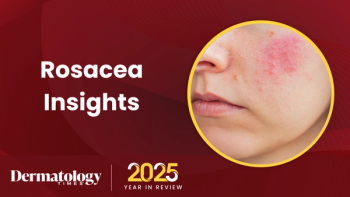
- Dermatology Times, May 2021 (Vol. 42, No. 5)
- Volume 42
- Issue 5
Study: Mask Usage Worsens Rosacea
Recent research shows prolonged face-mask usage leads to negative quality-of-life impact and worsening of disease for rosacea.
Face masks have become almost synonymous with coronavirus disease 2019 (COVID-19). Although their primary roles in the pandemic are contrary, they both negatively affect the skin— with COVID-19 appearing as skin manifestations such as “COVID toes” and face masks causing acne, popularly known as “maskne.” However, a recent survey conducted by Galderma found that face masks not only trigger acne but also worsen rosacea.1
The survey is a part of Galderma’s Face Up to Rosacea Campaign and included 220 respondents from Germany and Canada polled from December 2020 to January 2021. Galderma reports that 87% of respondents said they had a rosacea diagnosis from a health care provider (HCP) and that 13% were not diagnosed but believed they had the chronic skin disease.
Findings from the survey show 63% of rosacea patients experienced worsening of symptoms related to mask wearing, including pimples and/or pustules (72%), redness (75%), and more flare-ups (53%).
Additionally, 52% of respondents admitted to wearing a mask to hide the disease despite worsening of their symptoms, and 40% reported they don’t go out as often to avoid having to wear a mask. The survey also found that 30% are spending more time on their skin care routine than prior to the pandemic.
“During the current pandemic, self-medication and inadequate use of prescribed rosacea treatments are concerning,” Jerry Tan, PhD, adjunct professor at Western University in Ontario, Canada, said.1
“Many rosacea sufferers are hiding their rosacea under a mask to reduce embarrassment. This could, however, also be worsening their rosacea,” he added. “If you are suffering from rosacea, do not be afraid to book an appointment with your HCP via phone, video, or in person if possible. It is important to adhere to prescribed treatments and seek professional support if you are experiencing worsening of signs and symptoms because of mask wearing.”
Rosacea patients have also sought out different methods of treatment since mask wearing began. Survey results show nearly half (48%) of respondents have altered the management of their rosacea since they started wearing masks, including 51% opting for a nonprescription product and 27% being prescribed a new treatment by their HCP.
Despite reported worsening of disease symptoms, only 33% of respondents reported visiting their HCP in person and 8% via telehealth. Of patients who did not seek treatment with a HCP, 47% said they did not want to book an appointment and 21% had not been able to book one.
“With just a third of rosacea sufferers surveyed booking an appointment with their HCP during the pandemic, there is a huge cause for concern,” said Aliene Noda, global medical franchise lead for rosacea and onco-dermatology prescription GBU for Galderma in Lausanne, Switzerland.1 “Our survey suggests that more patients may be self-treating, which could mean they are using products that are not specifically tailored for their skin disease, and this could ultimately do more harm than good.”
Galderma’s survey is not the only research to show disease worsening of rosacea due to wearing face masks. A recent clinical study in Italy examined the effects of mask wearing in patients with rosacea and acne and found the persistent use of masks impacted quality of life and increased disease severity for both patient groups.2
In the study, investigators evaluated the skin of 36 patients with rosacea and 30 with acne before quarantine began and then 6 weeks in. Of the rosacea patients, 23 had papules and pustules and 13 had erythema. Rosacea patients wore face masks an average of 8 hours a day during this period.
At the beginning of the study, rosacea patients were recorded as having an average 2.56 Global Flushing Severity Score (GFSS) prior to lockdowns. That GFSS rose to an average of 3.97 after 6 weeks of masks and quarantine. Of the rosacea patients with papules and pustules, the GFSS increased from 1.83 to 2.73 after 6 weeks of masks and climbed from 2.85 to 6.08 for patients with erythema.
Persistent erythema was also recorded using the Clinician Erythema Assessment. Scores of patients with papules and pustules rose from 1.09 to 1.7 and from 2.46 to 3.54 for patients with erythema after 6 weeks of wearing masks.
In addition, the study evaluated quality of life using the Dermatology Life Quality Index (DLQI). After 6 weeks of wearing masks, DLQI scores increased from 7.35 to 10.65 in patients with papules and pustules and from 5.15 to 8.69 in patients with erythema.
Investigators recommended dermatologists strengthen rosacea therapy if patients report worsening of any of their symptoms in relation to wearing face masks. They also added that the type of mask worn could factor into the severity of how a patient is affected.
Despite the possibility of disease worsening, the investigators still recommended that rosacea patients follow public health directives and wear a mask when required.
References:
- Galderma online survey reveals essential COVID-19 mask wearing can be worsening rosacea skin disease. News release. Galderma. February 19, 2021. Accessed March 8, 2021.
https://www.prnewswire.com/in/news-releases/galderma-online-survey-reveals-essential-covid-19-mask-wearing-can-be-worsening-rosacea-skin-disease-832672850.html - Damiani G, Gironi LC, Grada A, et al. COVID-19 related masks increase severity of both acne (maskne) and rosacea (mask rosacea): multi-center, real-life, telemedical, and observational prospective study. Dermatol Ther. Published online February 3, 2021. doi:10.1111/dth.14848
Articles in this issue
over 4 years ago
Administrative Burden of Prescribing Biologicsover 4 years ago
Emerging Biologics Make Waves in ADover 4 years ago
Master Techniques to Treat Eye Issuesover 4 years ago
Current and Upcoming Topicals in the Pipeline for ADover 4 years ago
Off-label Biologics Target Wide Range of Skin Diseasesover 4 years ago
Debunking Sunscreen Controversiesover 4 years ago
Off-label Sarecycline Combats Papulopustular Rosaceaover 4 years ago
What’s Trending in Skin Care? May 2021Newsletter
Like what you’re reading? Subscribe to Dermatology Times for weekly updates on therapies, innovations, and real-world practice tips.









